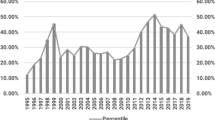Abstract
Although market-driven reforms are bringing hope for China's economic development, there has been an increasing visibility of corruption in the reform process. This article examines the relationship between corruption and reform in China by relating the corruption issue to certain reform policies. It finds that corruption results from unintended consequences of some intended reform policies, as these policies aimed at transforming China's socioeconomic structures at the same time inadvertently produce some political and economic conditions conducive to corruption. The unintended consequences are controllable, however, if a balanced reform agenda is developed.
Similar content being viewed by others
Author information
Authors and Affiliations
Rights and permissions
About this article
Cite this article
Gong, T. Corruption and reform in China: An analysis of unintended consequences. Crime Law Soc Change 19, 311–327 (1993). https://doi.org/10.1007/BF01624197
Issue Date:
DOI: https://doi.org/10.1007/BF01624197




